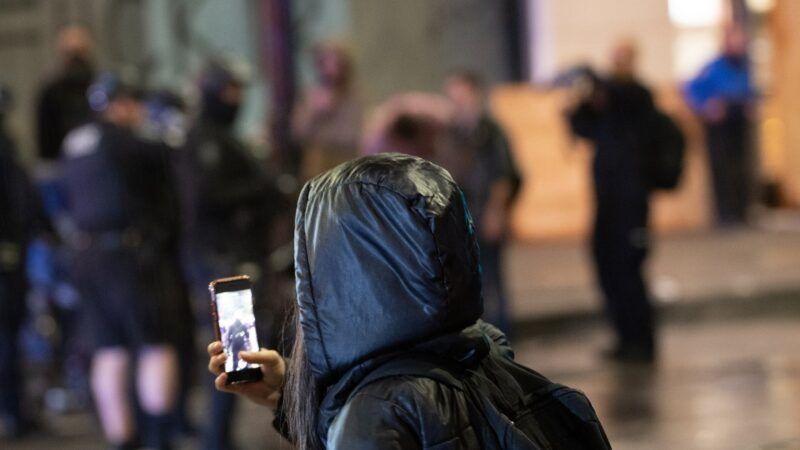Federal Judge Blocks Arizona Law Making It Illegal To Film Cops Within 8 Feet
"The Court fails to see how the presence of a person recording a video near an officer interferes with the officer's activities," the judge wrote.

A federal judge has temporarily blocked enforcement of a new Arizona law that makes it a misdemeanor crime to film police within eight feet.
Ruling in a First Amendment lawsuit filed by the American Civil Liberties Union of Arizona and several media organizations, U.S. District Judge for the District of Arizona John J. Tuchi held last Friday that the state's new law is unnecessary because of other laws on the books—"simultaneously over-inclusive and under-inclusive"—and not likely to survive strict scrutiny.
"If the goal of HB2319 is to prevent interference with law enforcement activities, the Court fails to see how the presence of a person recording a video near an officer interferes with the officer's activities," Tuchi wrote in his order issuing a temporary injunction against the law.
The law, passed earlier this year, makes it a misdemeanor offense to continue filming police activity from within eight feet of an officer after receiving a verbal warning. There are exceptions for filming the police in a private residence, during a traffic stop, and if the person filming is the subject of the police encounter. But the law qualifies those exceptions, saying they apply only if the person recording is "not interfering with lawful police actions" or "unless a law enforcement officer determines that the person is interfering in the law enforcement activity or that it is not safe to be in the area and orders the person to leave the area."
The bill's sponsor, state Rep. John Kavanagh (R–Fountain Hills), wrote in a March USA Today op-ed that he introduced it "because there are groups hostile to the police that follow them around to videotape police incidents, and they get dangerously close to potentially violent encounters."
However, multiple federal appeals courts have upheld the right to film police as a core First Amendment activity. Civil liberties groups and media organizations fiercely opposed the bill, saying it would have a chilling effect on the public and reporters, especially when trying to record police activity in crowds, during protests, or on narrow sidewalks.
The Phoenix New Times reported that attorneys for the Arizona House and Senate warned lawmakers that there were potential constitutional issues with the law. However, the legislature passed it anyway.
The federal lawsuit challenging the law, filed last month, argues that it "creates an unprecedented and facially unconstitutional content-based restriction on speech about an important governmental function."
"Today's ruling is an incredible win for our First Amendment rights and will allow Arizonans to continue to hold police accountable," K.M. Bell, a staff attorney for the ACLU of Arizona, said in a press release. "At a time when recording law enforcement interactions is one of the best tools to hold police accountable, we should be working to protect this vital right—not undermine it."
The relatively quick turnaround between the filing of the lawsuit and the judge's preliminary injunction is partly due to the Arizona attorney general's office and the Maricopa County sheriff's and prosecutor's offices declining to defend the law in court.
"I was assuming that the attorney general would do his job as the state's attorney and defend a law passed by the state," Kavanagh told NBC News. "We are trying to get together with the [House] speaker and the [Senate] president and see if the Legislature will defend it, but there's also the possibility of some outside group possibly stepping up."
Enforcement of the law, which was set to go into effect on Sept. 24, is now on hold while the lawsuit continues. The ACLU and other plaintiffs are seeking a permanent injunction against it.
The Arizona state legislature will now have to decide if it wants to defend the law it passed.
